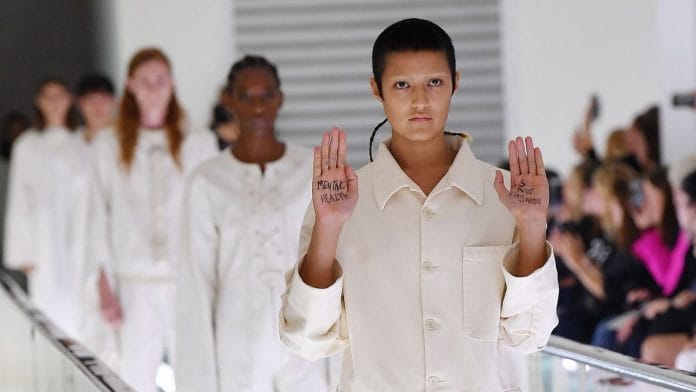New Delhi: Gucci has once again upset some people with its modernistic fashion.
The fashion house, which showcased its spring/summer 2020 collection at the Milan Fashion Week on Sunday, included an austere line of clothing in all-white, with big straps that unmistakably resembled straitjackets.
The controversy heated up with model Ayesha Tan Jones critiquing the brand for its choice. Jones, who walked the runway, held up her palms in silent protest with the words ‘Mental health is not fashion’ written on them.
https://www.instagram.com/p/B2wARwMAu1t/?utm_source=ig_web_copy_link
In a post on Instagram later, she called out Gucci for designing outfits “alluding to mental patients while being rolled out on a conveyor belt as if a piece of factory meat”, and said straitjackets symbolise “a cruel time in medicine when mental illness was not understood”.
“Presenting these struggles as props for selling clothes in today’s capitalist climate is vulgar, unimaginative and offensive to the millions of people around the world affected by these issues,” she added.
‘Not meant to be sold’
The clothes were designed by Gucci’s creative director Alessandro Michele, who described them as “blank styled clothes which represent how through fashion, power is exercised over life, to eliminate self-expression”. The beige and ivory coloured outfits represent “the normative dress dictated by society and those who control it,” Gucci also explained.
After some criticised the clothing on Twitter, the fashion brand clarified the clothes were a statement for the fashion show and will not be sold. It later also called on people to join the “discussion”.
#intheseclothes is an open conversation on how clothes can define our identity and tell our story, and sometimes make history: the world's, or our own—an idea explored by #AlessandroMichele in the #GucciSS20 fashion show. Join the discussion. pic.twitter.com/3ApCczZWRe
— gucci (@gucci) September 22, 2019
Not the first controversy
Gucci is no stranger to fashion controversy, despite its gestures such as donating to a gun-control march and banning fur from runways making it popular among young consumers. Earlier this February, it apologised for a $890 black turtleneck sweater that resembled blackface. Blackface is considered racist and offensive since white performers used to paint their faces to mock people of colour.
A few months before that, in December 2018, it drew flak for selling a ‘full indy turban’ for $800, and was accused of cultural appropriation.
Dear @gucci, the Sikh Turban is not a hot new accessory for white models but an article of faith for practising Sikhs. Your models have used Turbans as ‘hats’ whereas practising Sikhs tie them neatly fold-by-fold. Using fake Sikhs/Turbans is worse than selling fake Gucci products pic.twitter.com/sOaKgNmgwR
— Harjinder Singh Kukreja (@SinghLions) May 16, 2019
The turban is not just an accessory to monetize; it's a religious article of faith that millions of Sikhs view as sacred. Many find this cultural appropriation inappropriate, since those wearing the turban just for fashion will not appreciate its deep religious significance. pic.twitter.com/fldmxa3Wvr
— Sikh Coalition (@sikh_coalition) May 14, 2019
Other fashion brands have also been caught on the wrong foot, such as Prada, which also withdrew products depicting blackface.
A Burberry sweater from the this year’s fall fashion line drew criticism for appearing to have a noose around its neck. Model Liz Kennedy reportedly slammed the brand on Instagram, saying, “Suicide is not fashion… Riccardo Tisci and everyone at Burberry, it is beyond me how you could let a look resembling a noose hanging from a neck out on the runway. How could anyone overlook this and think it would be OK to do this, especially in a line dedicated to young girls and youth.”
Riccardo Tisci, Burberry’s chief creative officer, apologised and assured that he is “committed to learn from this so that this never happens again”.
(With inputs from Bloomberg)






